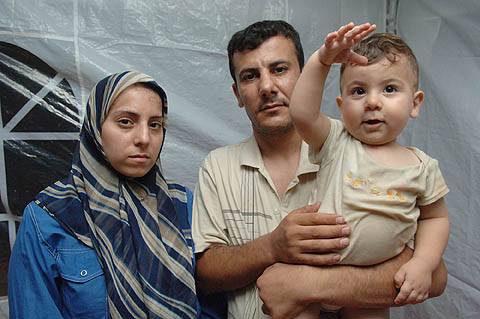Sanayaa Park Refugee Centre, Lebanon - Sun August 6th - Photo Report
GS | 11.08.2006 16:15 | Lebanon War 2006 | Anti-militarism

.
‘I came here to visit my family from the United Arab Emirates where I live. I am an internet security analayst. I came here before the bombing started, I decided to stay to help in any way I could. I could not sit and watch it on the TV. My cousin told me that homeless families were gathering in this park. So we established a small committee mainly from university students. We are not connected to any NGO or official organisation. We asked around the neighbourhoods for donations and food and people were very generous, giving whatever they could. We did not originally want people to sleep here. We wanted this to just be a refugee contact centre. It is unsafe and unhealthy to live here. There are no basic facilities for hygiene and it is an obvious target for a bombing with no cover from attack - but now there is no choice. At first there were 50 people here, on Tuesday we did a count and found that there were 870 people sleeping in the park, from 179 families. Many more have arrived since then. Our main fear is that soon we could see an epidemic of diseases like Cholera and Typhoid that are presently unheard of Lebanon. We found last week that 60% of the camp children had lice; we treated everyone as a precaution. We have been giving vaccinations to people wherever possible. We have established a First Aid tent and local people and pharmacies have donated medicines. We also have volunteer doctors and a dentist that come every day but we don’t have 24 hour medical care.’
I am introduced to Bilal Awada who, along with his wife and fourteen month-old baby, has been here for 20 days. He had run a mobile phone shop in the southern border town of Aitaroun, previously home to around 5,000 Lebanese of mixed faiths. He tells me their story.
‘After the second day of the war we left. At first we were not sure if the situation would escalate. Then 50% of the town fled. We came with just our clothes. The Israelis do not differentiate between the Hizbollah army and ordinary people. Fifteen days ago there were two massacres in the town. An entire family of thirteen were killed when their home took a direct hit in an air strike, another smaller family were also wiped out. My cousin and his family came to visit from Germany just before the war started, we have had no news of him. He has seven children. There is no power, water or working phone lines in the town.
'Here it is very difficult. There are very few washrooms and showers. Care is provided for the baby; milk and diapers, but I still have to feed and clothe my family. There is no consistent medical care, if someone has a stomach ache they are given some herbs and have to wait till the morning to see a doctor. We have heard that planes are still landing in Beirut but we have not seen any of this aid. All the roads bringing aid from Syria have been bombed. Are trying to starve us as well? My uncle has a small business I have been earning a small wage from him helping out in his shop.
'Now I want to ask you a question? These countries like Germany, France and Belgium, the ones who are known for their compassion and campaigning for human rights? Why do they not let us in? Even if the adults have to stay why do they not take the children until the war is over?’
Good question……
Words and pictures copyright the author but free to progressive media, NGOs ect. Contact by email for details.
GS
 e-mail:
guy.smallman@btinternet.com
e-mail:
guy.smallman@btinternet.com
Comments
Display the following comment